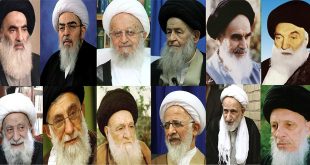A scientific roundtable discussion focusing on "Women's Participation in Ijtihad" was held in the office of Hujjat al-Islam wal al-Muslimin Mojtaba Elahi Khorasani, a distinguished professor of Islamic studies and instructor of Advanced Level Studies of Mashhad Seminary.....
Read More »Ijtihad, Intellectual and Legislative Development
Muslims do not believe in the conciliatory Ijtihad that sets out to justify the legal reality of many cases of deviation.
Read More »Was Muḥammad Amīn al-Astarabādī a Mujtahid?
Since the turn of the twentieth century, the main biographical sources and studies dealing with the life and thought of Muḥammad Amīn al-Astarabādī (d. 1036/1626-7) have upheld the view that he....
Read More »Ayatollah Muhammad Baqir Sadr, A Sign of Jihad & Ijtihad
Martyr Ayatollah Muhammad Baqir al-Sadr was a notable Shia cleric, philosopher, and ideological founder of the Iraq Islamic Dawa Party
Read More »Can A Woman Reach the Rank of Ijtihad in Religious Seminaries?
A worthy interaction of Islam with science, and requiring that from every Muslim man and woman, has resulted in women always studying the sciences in Islamic communities and finally some of...
Read More »An Introduction to Islamic Jurisprudence (fiqh), Part 2
In Shahīd Thānī's point of view, ijtihad is contingent upon the knowledge of some studies including: morphology and syntax, terminology, etymology, rhetoric, uṣūl al-fiqh (principles of Islamic jurisprudence), logic, rijāl (scrutiny of...
Read More »An Introduction to Islamic Jurisprudence (fiqh), Part 1
Fiqh is briefly defined as "the knowledge of inferring (istinbāṭ) aḥkām sharʻī". The term istinbāṭ (inference) literally means appearing after being hidden, so extracting water from the depth of a well is called nibṭ. Therefore extracting and discovering aḥkām sharʻī from...
Read More »Ijtihad in Twelver Shiism: The Interpretation and Application of Islamic Law in the Context of Changing Muslim Society
The purpose of the thesis is to investigate whether Islamic laws, without relaxing the nature of the Shari 'a, could be expanded and adapted to meet the changing needs of modem Muslim societies....
Read More »Marjaiyya in Iraq and Iran
Marja' is a mujtahid who is followed by a number of the Shi'as, that is, some Shi'as practice their religious acts in accordance with that of mujtahid's jurisprudential views (that is, fatwas) and pay their judicial alms (al-wujuhat) to him or his representatives. To follow a religious scholar in...
Read More »Article: Shi‘i ‘Ulama and Ijāza during the Nineteenth Century
There were two types of ijāzas: an ijāza of ijtihād and an ijāza of riwaya. Modern researchers maintain that an ijāza of ijtihād permitted the holder to exercise ijtihād, and that attaining the ijaza was a prerequisite to...
Read More » Ijtihad Network Being Wise and Faithful Muslim in the Contemporary World
Ijtihad Network Being Wise and Faithful Muslim in the Contemporary World








